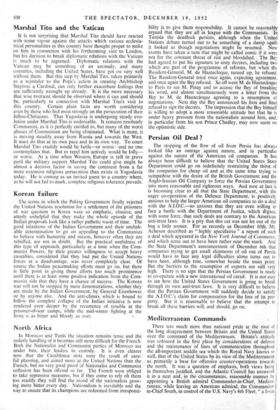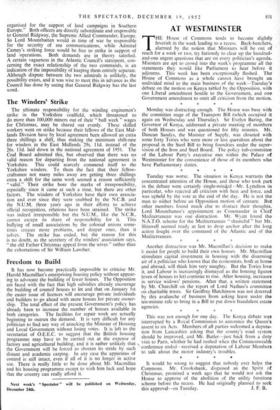Mediterranean Commands
There was much more than national pride at the root of the long disagreement between Britain and the United States over the command of the Mediterranean. Britain's attitude was coloured in the first place by considerations of defence and the maintenance of lines of communication throughout the all-important middle sea which the Royal Navy knows so well, that of the United States by its view of the Mediterranean as primarily a base for offensive counter-operations towards the north. It was a question of emphasis, both views being in themselves justified, and the Atlantic Council has answered it in a neat and, in the circumstances, reasonable manner by appointing a British admiral Commander-in-Chief, Mediter- ranean, while leaving an American admiral, the Commander- -in-Chief South, in control of the U.S. Navy's 6th Fleet, " a force organised for the support of land campaigns in Southern Europe." Both officers are directly subordinate and responsible to General Ridgway, the Supreme Allied Commander, Europe. So Lord Mountbatten would in time of war be responsible for the security of sea communications, while Admiral Canvey's striking force would be free to strike in support of land operations. Both demands are in theory satisfied. A certain vagueness in the Atlantic Council's statement, con- cerning the exact relationship of the two commands, is an indication of the impossibility of keeping them entirely separate. Although dispute between the two admirals is unlikely, the possibility exists, and it was wise to meet this in advance as the Council has done by seeing that General Ridgway has the last word.



































 Previous page
Previous page